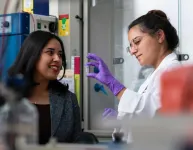Carleton's Dominque Roche investigates why researchers are wary of sharing data
2021-04-21
(Press-News.org) Carleton University's Marie Curie Global Fellow Dominique Roche has co-authored a paper on the barriers researchers face to publicly sharing their data, an issue that has gained prominence during the COVID-19 pandemic. The article, Reported Individual Costs and Benefits of Sharing Open Data among Canadian Academic Faculty in Ecology and Evolution, was published in the journal BioScience.
"The COVID-19 pandemic has made people from all over the world grasp the importance of sharing research data to speed up scientific discoveries," said Roche. "Clearly, open data have been key in fighting the pandemic, but they're also really important to tackle other urgent problems, like climate change and biodiversity loss."
Roche and co-author Sandrine Soeharjono, who did this work while doing her Masters in Quantitative and Computational Biology at Université de Montréal, surveyed academics in Canada and asked about individual costs and benefits of sharing open data.
It seems everyone agrees that data sharing is good for science and society, but many researchers don't want to share this information because they fear the personal costs in terms of career advancement. Roche's previous work has shown that there are many barriers to scientists sharing their data and that those who do share often do not do it well. These barriers include fear of others misusing the data, scooping discoveries, privacy issues, not receiving credit for their work and the risk of shaming for data that is taken out of context.
"I was excited to work on this project because I believe that scientific data should be open-access in order for society to reap the full benefits of academic research," said Soeharjono. "We are social creatures after all, and should aspire to thrive from collaboration instead of competition. I am glad to see that many researchers are on-board. If this kind of study can prompt a single conversation about the movement, I consider that a step forward."
Roche and Soeharjono suggest several solutions to overcoming the hesitancy to sharing open data. These solutions include creating better guidelines, standards and training for data sharing, providing greater support for research data management and equity in sharing practices, and providing better incentives for sharing and better protection from potential negative outcomes.
"Some researchers are really worried about sharing their data and our results are exciting because they suggest that these fears are largely unwarranted," said Roche. "Ninety percent of researchers answered that sharing their data had led to beneficial or neutral outcomes, with only one in five saying they had experienced some form of cost. Our hope is that our results will encourage researchers to continue sharing their data even after the pandemic is over."
INFORMATION:
BioScience, published monthly by Oxford Journals, is the journal of the American Institute of Biological Sciences (AIBS). BioScience is a forum for integrating the life sciences that publishes commentary and peer-reviewed articles. The journal has been published since 1964. AIBS is an organization for professional scientific societies and organizations, and individuals, involved with biology. AIBS provides decision-makers with high-quality, vetted information for the advancement of biology and society. Follow BioScience on Twitter @AIBSbiology.
Oxford Journals is a division of Oxford University Press. Oxford Journals publishes well over 300 academic and research journals covering a broad range of subject areas, two-thirds of which are published in collaboration with learned societies and other international organizations. The division has been publishing journals for more than a century, and as part of the world's oldest and largest university press, has more than 500 years of publishing expertise behind it. Follow Oxford Journals on Twitter @OxfordJournals.
ELSE PRESS RELEASES FROM THIS DATE:
2021-04-21
Real-world disease and parasite monitoring is often hampered by the inability of traditional approaches to easily sample broad geographical areas and large numbers of individuals. This can result in patchy data that fall short of what researchers need to anticipate and address outbreaks. Writing in BioScience, Jessica Farrell (University of Florida), Liam Whitmore (University of Limerick), and David Duffy (University of Florida) describe the promise of novel molecular techniques to overcome these shortcomings.
By sampling environmental DNA and RNA (eDNA and eRNA), the authors say, researchers will be better able to ...
2021-04-21
A new study in laboratory rats has discovered a direct link between low oxygen in the womb and impaired memory function in the adult offspring. It also finds that anti-oxidant supplements during pregnancy may protect against this.
Low oxygen in the womb - known as chronic fetal hypoxia - is one of the most common complications in human pregnancy. It can be diagnosed when a routine ultrasound scan shows that the baby is not growing properly and is caused by a number of conditions including pre-eclampsia, infection of the placenta, gestational diabetes or maternal obesity.
The new results show that chronic fetal hypoxia leads to a reduced density of blood vessels, and a reduced number of nerve cells and their connections in parts of the ...
2021-04-21
Handwashing is shaping communities of bacteria that live and grow in the plumbing of domestic sinks, scientists have found.
In the largest study of sink bacteria conducted outside of hospitals, scientists at the University of Reading discovered communities of similar bacteria that largely remain down our drains after hand washing.
The researchers found that there are significant differences between families of dominant bacteria depending on the location in the sink drains, and that plumbing systems such as P-trap or U-bend provides ideal environments for bacteria to grow.
Dr Hyun Soon Gweon, Lecturer in Bioinformatics for Genomics at the University of Reading, said:
"The mantra to 'wash your hands' to fight coronavirus transmission has highlighted the importance of ...
2021-04-21
COVID-19 could pass into people's lungs from saliva with the virus moving directly from mouth to bloodstream - particularly if individuals are suffering from gum disease, according to new research.
Evidence shows that blood vessels of the lungs, rather than airways, are affected initially in COVID-19 lung disease with high concentrations of the virus in saliva and periodontitis associated with increased risk of death.
The researchers propose that dental plaque accumulation and periodontal inflammation further intensify the likelihood of the SARS-CoV-2 virus reaching the lungs and causing more severe cases of the infection.
Experts say this discovery could make effective oral healthcare ...
2021-04-21
General anaesthesia is widely used for surgery and diagnostic interventions, to ensure the patient is completely unconscious during these procedures. However, in a paper published in Anaesthesia (a journal of the Association of Anaesthetists) ethics and anaesthesia experts from the University of Oxford say that general anaesthesia should be more widely available for patients at the end of their lives.
Painkilling medications (analgesia) are commonly given to dying patients. But they may not be enough, leading to the use of continuous deep sedation (also known as "palliative" or "terminal" sedation).
"However, for some patients these common interventions are not enough. Other patients may express a clear desire to be completely unconscious as they die," explains ...
2021-04-21
In 2003 in Haiti, a 20-year-old in treatment for HIV could have expected to live to 34. But as of 2017, life expectancy for a 20-year-old in treatment for HIV in Haiti is now 61, compared to 70 for Haiti's general population.
A research team from Vanderbilt University Medical Center and institutions across Latin America today reports what looks to be far the largest study to date of life expectancy for people living with HIV infection in low-income or middle-income countries.
With a focus on 30,688 people treated for HIV between 2003 and 2017 in seven Latin American countries, the study, published ...
2021-04-21
Study of 30,000 adults living with HIV receiving antiretroviral therapy (ART) in Latin America and the Caribbean finds life expectancy has increased to within 10 years of the general population in these countries over the last two decades.
Disparities in life expectancy due to demographic and clinical factors at the point participants began ART (including sexual HIV transmission risk, low CD4 cell count, and history of tuberculosis) highlight an ongoing need to reach vulnerable populations in the region.
Life expectancy among adults living with HIV receiving antiretroviral therapy (ART) ...
2021-04-21
When disease outbreaks happen, response time in developing and distributing treatments is crucial to saving lives. Unfortunately, developing custom drugs as countermeasures is often a slow and difficult process.
But researchers at the University of Colorado Boulder have created a platform that can develop effective and highly specific peptide nucleic acid therapies for use against any bacteria within just one week. The work is detailed in Nature Communications Biology and could change the way we respond to pandemics and how we approach increasing cases of antibiotic resistance globally.
The Facile Accelerated Specific Therapeutic (FAST) platform was created by Associate Professor Anushree Chatterjee ...
2021-04-20
Researchers at the University of Jyväskylä highlight how the struggles caused by the COVID-19 pandemic can guide us towards an equitable use of our shared environment and a transition towards sustainability.
COVID-19 crisis has emphasized how poorly prepared humanity is to cope with global disasters and to face the new ecological norm under climate change, degraded ecosystems, and biodiversity loss. The final consequences of COVID-19 crisis on sustainability are not yet known. However, this crisis offers a unique opportunity to move towards a greener, ...
2021-04-20
Coral reefs around the world are under threat from rising sea temperatures, ocean acidification, disease and overfishing, among other reasons.
Tracking signs of stress and ill health is difficult because corals -- an animal host coexisting with algae, bacteria, viruses and fungi -- are dynamic organisms that behave differently depending on what's happening in their environment. Some scientists wonder if recording changes in coral movements over time could help with monitoring a coral reef's health.
This is not always a straightforward task. Some coral species wave and pulse in ...
LAST 30 PRESS RELEASES:
[Press-News.org] Carleton's Dominque Roche investigates why researchers are wary of sharing data


